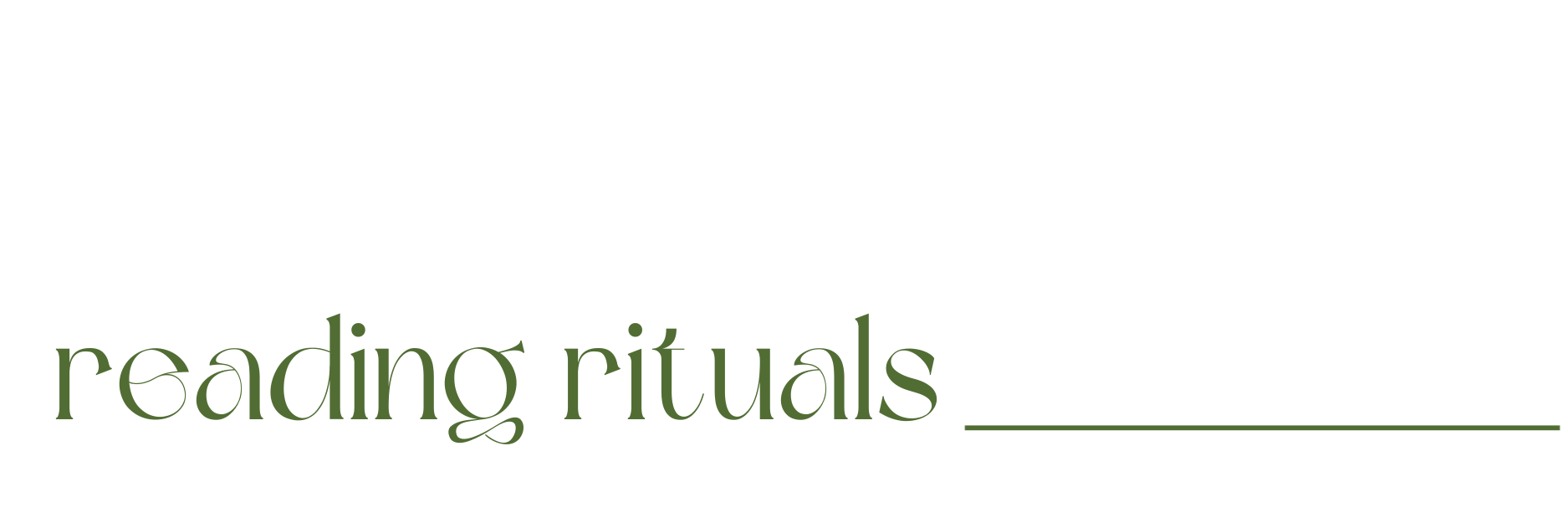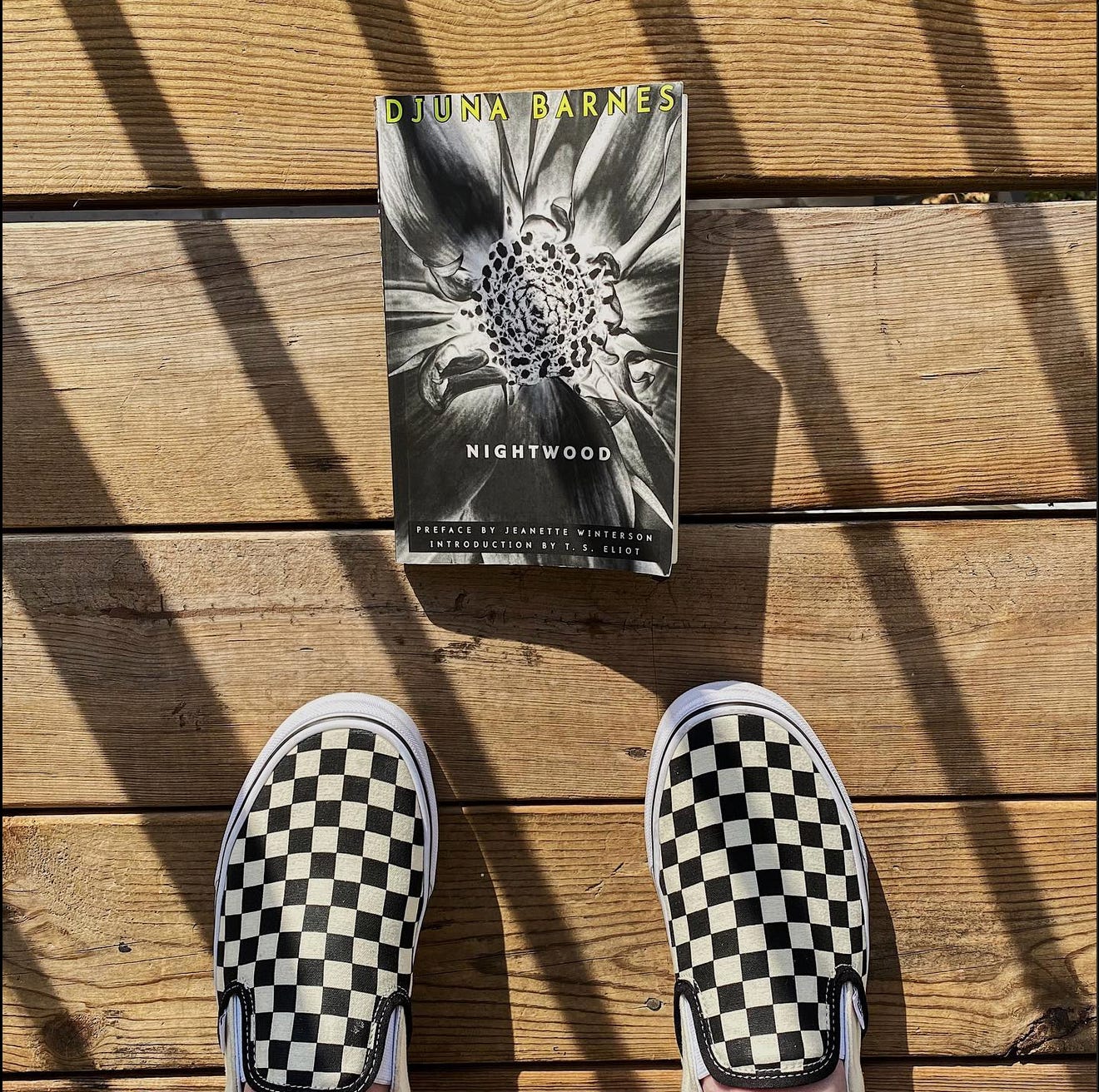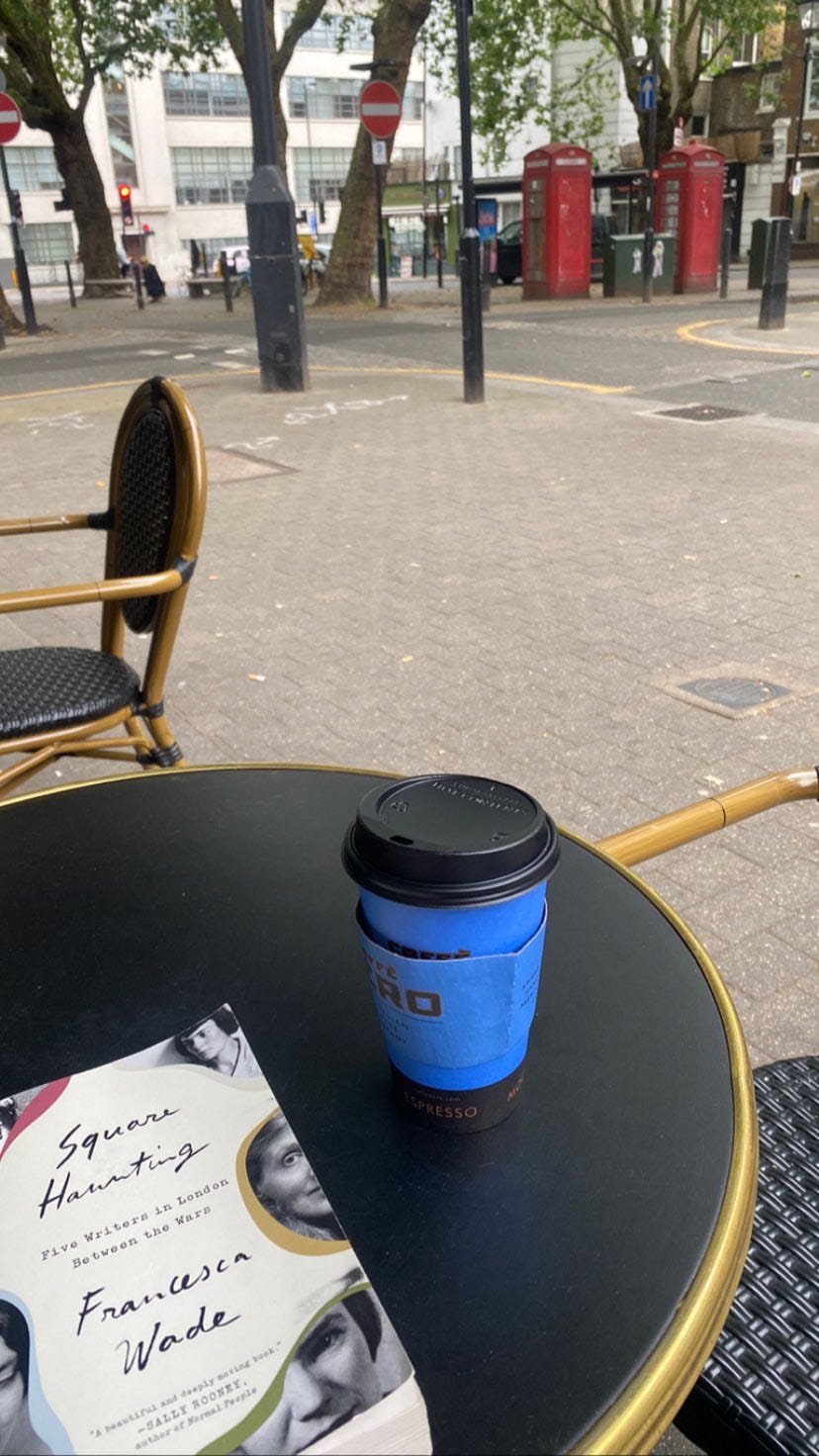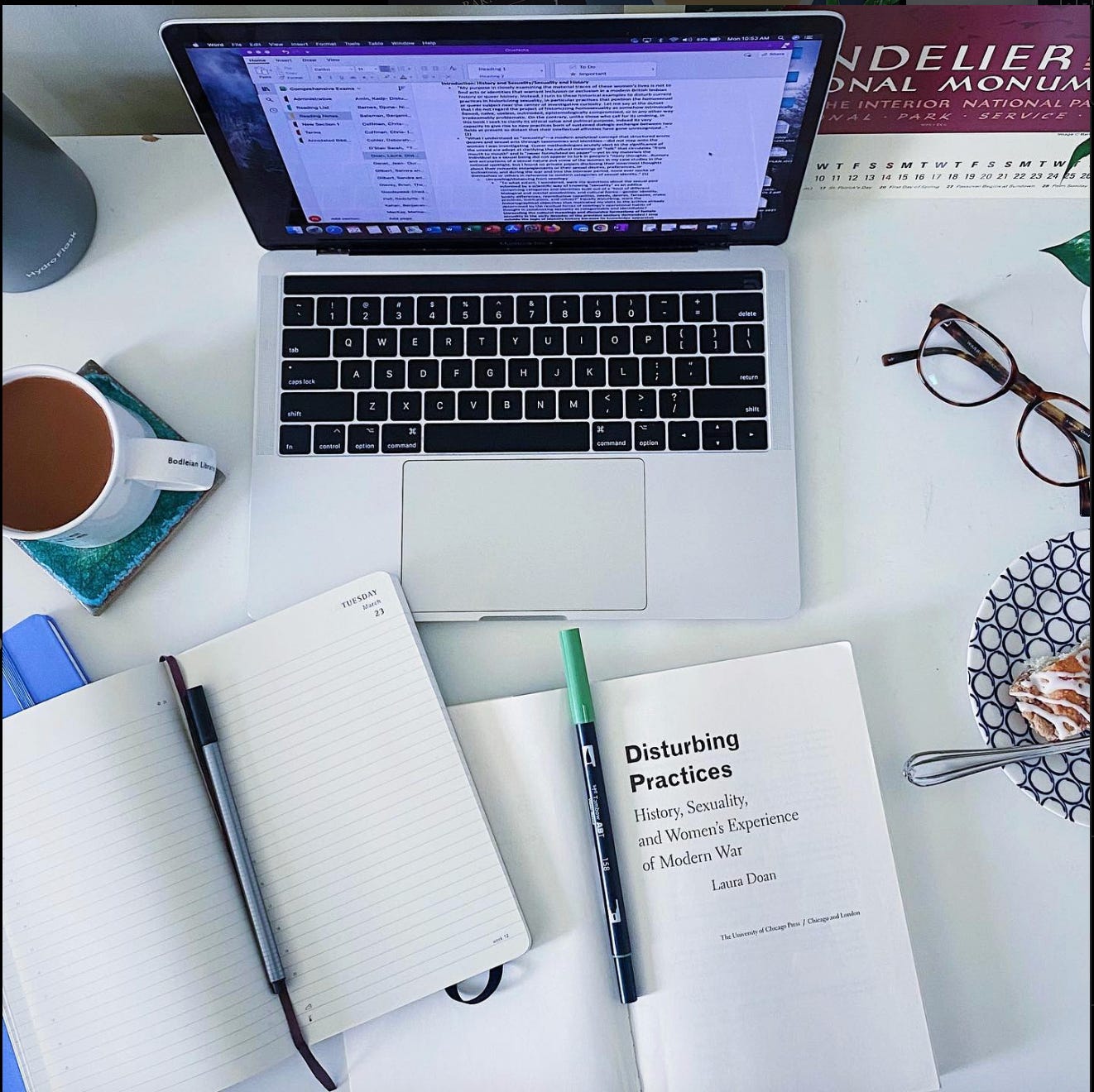Close Reader: An interview with Sarah
On reading in public, studying spiritualism in modernist lit, and writing a dissertation
In this series, I ask some of my favorite Substack essayists, Bookstagrammers, and writers to share their reading and writing processes and habits, and tell us about the literary ideas they’re spending time with these days.
Today’s interview is with Sarah, who is one of my favorite bookstagrammers! You can find her beautiful posts and reflections on modernist lit and life as a grad student on her Instagram page: @graphicmemoir
Let’s start with an introduction! What’s your name and where are you currently living? Tell us a bit about you.
Hello! I'm Sarah and I currently live in Michigan with two cats, a crested gecko, and an auburn-haired fiancé :)
What are you reading right now?
I've always got a few books in rotation. I usually like to be reading something in the fantasy realm, a literary fiction novel, a work by a modernist woman writer, and various research/nonfiction books.
Right now I'm reading Assassin's Apprentice by Robin Hobb, I'm slowly working my way through Thomas Hardy's Jude the Obscure, re-reading The One Who Is Legion by Natalie Barney, and also recently started Angels of Modernism: Religion, Culture, Aesthetics, 1910-1960 by Suzanne Hobson.
What are some of your favorite books or genres?
Lucy by Jamaica Kincaid
Most everything I've read by Maggie O'Farrell
Days of Abandonment by Elena Ferrante
Passing by Nella Larsen (everything by Nella Larsen, really)
To the Lighthouse by Virginia Woolf
Juliet Marillier is my favorite historical fantasy writer, so I've read probably 5 of her books and am slowly working my way through all her series
What ideas are you studying or exploring right now?
I am interested in modernist women and spirituality, particularly the occult and witchcraft (and not just because it's spooky season!), but also the ways they adopted and adapted more traditional forms of spirituality and religion and made them their own.
I read Lolly Willowes by Sylvia Townsend Warner for the first time recently, which really started it off, but since then I've discovered that a lot of the authors I love do surprising things with spirituality in their fiction—Radclyffe Hall has an unpublished short story about a queer feminine saint, Vita Sackville West wrote a convent novel, and Zora Neale Hurston published a story called “Mother Catherine” about a spiritual healer in New Orleans who cultivates a spirituality comprised of aspects of Catholicism, West African spiritual traditions, and voodoo, just to name a few!
What is your reading method? Tell us about your reading routine, habits, quirks, anything you'd like to share.
I read best in public places. I don’t know why, but it’s true! I’ve done some of my best reading at the auto repair shop, on a train, at the airport, in libraries and coffee shops. I think there is something really insulating about reading while in public— like you are able to create your own, comforting little world in the midst of the chaos around you. I already have my own comforting, little world at home, so maybe that’s what makes it less appealing? If I can get myself to settle down and read at home, though, I do love cuddling up on the couch with my cats. They make excellent reading buddies.
Do you prefer to read hardbacks, paperbacks, or digital copies? Why?
I prefer reading paperbacks. For some reason digital copies make me feel like I need to speed through the reading process, and hardbacks feel too precious. Paperbacks are a perfect in-between — I still have to slow down my reading pace, but I feel a little bit better about throwing them in my bag, reading them in the bath, scribbling in the margins, etc.
What’s your annotation process like, while you read? Do you write in your books? Why or why not?
I have always liked writing in books or at least marking passages to come back to. If I have to stop and take notes, it really takes me out of the atmosphere of the book. When I started getting a lot of books out of the library for research purposes, though, I developed my own little color code with Post-It flags, which has somewhat stuck. I think these days I do a bit of Post-It flagging and a bit of marking.
Speaking of writing, what is your current writing project?
Really the only writing I'm doing right now is my Ph.D. dissertation, which is largely focused on the topic of queer modernist women and spirituality that I mentioned above. Occasionally I'll jot down some lines to song lyrics or poems in the Notes app on my phone, but those are somewhat few and far between!
Describe your writing process. Where do you start? How do you get focused?
I love researching much more than I love writing, so the majority of my time spent on a project is definitely the research phase. It's only once I've got a huge amount of research under my belt that I feel I have a direction to follow. For that reason, I'm a huge fan of outlining. I'll sort of sketch out a general outline, and as I read make changes to it. Then I've got a nice plan to go by when it's time to write.
I'm a big fan of reading for a few minutes before starting to write to get the sound of words into my head. Sometimes jumping into writing cold feels like trying to make something out of nothing, so the rhythm of someone else's writing is helpful for finding my own.
Speaking of rhythm, I recently discovered "binaural beats" on YouTube for concentration, which is awesome! It's sort of like a mix between EDM and lo-fi music, so there is a steady thrum that keeps my brain focused, but no lyrics to distract from what I'm trying to hear myself say on the page. I've always been a big fan of wearing headphones and listening to instrumental music while writing. Classical music and chilled out lo-fi is helpful if I'm feeling particularly anxious, but something with a heavy beat helps if I need to feel energized.
Describe your revision process. How do you go back into a piece of writing to revise?
I think I'm a little bit old-fashioned because sometimes if I'm having a particularly difficult time I like to print out a draft and revise with a pen. There's just something about looking at a hard copy that makes me feel more like an objective reader, rather than looking at the same Word doc that I've looked at a thousand times. If the words on the page always look the same, it's hard to find the areas to revise and how they fit in. Seeing the white space on a printed out page helps me create space in my brain and in the writing itself to add things or change them.
“I think I'm a little bit old-fashioned because sometimes if I'm having a particularly difficult time I like to print out a draft and revise with a pen.”
Describe your editing process. What’s that like? Do you self edit? Reach out to friends?
My fiancé is a reader and a writer, so that is very helpful. I have a low-stakes sounding board at home, and he is always willing to read and help me edit. I have been known to agonize over the same piece for weeks on end, so sometimes it's good to go ahead and show it to someone else so that I don't get stuck. I've also become less shy about sharing my writing with friends, which has been so freeing! I've struggled with a lot of imposter syndrome—thinking the quality of my writing must be severely subpar compared to other folks in my graduate program—so having trusted friends to be open and share drafts with has been a huge help in that regard.
What is the relationship between reading and writing, to you? Where are the overlaps? Where are the important distinctions?
I mentioned earlier that I sometimes like to read before writing, and I think that tells me a lot about how the two overlap for me. There is something there about rhythm, finding rhythm, hearing the way the words and sentences sound in my head. I think that must be why I like writing song lyrics and poems, but not necessarily fiction. If I can hear the words in my head as I'm reading, I can get into a rhythm, and that's when I do my best reading. It's the same with writing—there has to be a flow, a thrum, a current of ideas.
Someone once asked me why I wanted to go to graduate school for English, and I told them about how much I love reading fiction and what it has meant to me. They responded in a way that really hurt me, saying essentially that "those who can't do, teach." I think there is a real misconception there: that people who love to read stories but don't necessarily write stories are somehow just failed storytellers. I don't think that's the case. Even if you don't write books, chances are you are constantly telling yourself stories and constructing scenes in your head, because those are the skills you practice when you read!
So I guess I'd just like to say to all those who love to read but aren't confident in their writing or don't like to write—reading is not just a passive act, but a generative one. Readers are just as creative, thoughtful, and observant as writers, even if their creativity never finds its way onto its own page.
“I think there is a real misconception there: that people who love to read stories but don't necessarily write stories are somehow just failed storytellers.
I don't think that's the case.”
What’s your current coffee or tea order?
I am a simple gal. Everywhere I go I like to try their almond milk latte. But it must be hot! I'm partial to a cozy, warm beverage over an iced one.
Anything else you’d like to share about writing, reading, or annotating?
Thank you for helping me think about my own writing, reading, and annotating processes. These are things I haven't thought deeply about before, but I learned a lot about myself from answering these questions!
Lastly, for those who want to get to know you better, where can they find your work? Share your @ for anyone who wants to follow along!
I am on Instagram at @graphicmemoir and hang out there because I get a lot of inspiration from other people's posts. I am admittedly not the absolute greatest at keeping up with my own social media posts, but I will always respond to DMs!
Thank you so much for sharing all about your reading and writing processes, Sarah! It’s so fun to get a look into your research and what you’re studying these days.
For more interviews and weekly close readings, subscribe to Closely Reading now.














Sarah's comments about the research being the best part vs writing just hit home!
I also really love reading in public, which is something my partner cannot wrap his head around, and I'm always happy when I find others who function in a similar way!
A fantastic interview, thank you Haley and Sarah. And like Kate, a big yeah to the reading choices 🧡